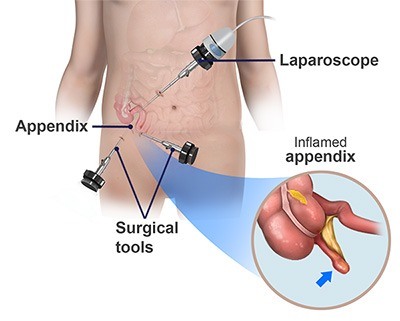Appendicectomy
What is appendicectomy?
Appendicectomy is the surgical removal of the appendix. It is the most commonly performed emergency surgery.
What is the appendix?
The appendix is a small finger-shaped organ attached to the caecum (first part of the colon). Its function is unknown. Blockage of the appendix because of infection, cancer, stool or foreign body leads to appendicitis, the inflammation of the appendix.
What are the symptoms of appendicitis?
Appendicitis is characterised by pain, swelling of the stomach, loss of appetite, nausea and vomiting.
How is appendicitis diagnosed?
Appendicitis is difficult to diagnose by symptoms as they can be common to other disorders as well. Some of the tests that your doctor may order to diagnose appendicitis include an inspection of your abdomen for inflammation, blood and urine test and imaging studies such as CT scan and/or ultrasound.
What are the consequences of not treating appendicitis?
Left untreated, appendicitis can be life-threatening. It can perforate or burst, releasing infectious substances into the abdominal cavity.
What are the options for appendicitis treatment?
The standard treatment for appendicitis is the surgical removal of the appendix.
What are the alternate treatments for appendicitis?
Some studies indicate that antibiotics may help treat appendicitis.
How do I prepare for appendicectomy?
Before appendicectomy, you will be instructed not to eat or drink anything for 8 hours. Inform your doctor about the prescription drugs that you take on a regular basis. You will be advised on the ones you can take and those you should avoid. Antibiotics will be administered before the surgery.
How is appendicectomy performed?

Appendicectomy is performed under general anaesthesia, by open or laparoscopic approach. Open surgery, called laparotomy, involves a single long incision in the lower right area of the abdomen. Laparoscopic surgery uses several smaller incisions, a laparoscope and special surgical tools. The laparoscope, a thin long lighted tube with a camera attached, provides your surgeon with a clear magnified view of the surgical site on a large monitor.
By either method, your surgeon inserts a harmless gas into the abdominal cavity to expand the viewing area of the abdomen. Once the appendix is identified, it is tied off and removed. The area is then washed with sterile fluid to minimise the risk of infection. The incision(s) is closed and bandaged.
Sometimes an abscess, a puss-filled mass, called an appendiceal abscess, forms around a burst appendix. This may be addressed before or during appendicectomy surgery by placing a tube in the abscess through the abdominal wall with the help of CT imaging. The drainage tube is left in place for about 2 weeks while antibiotics are given to treat infection. Six to eight weeks later, when infection and inflammation are under control, surgery is performed to remove what remains of the burst appendix.
What can I expect after appendicectomy?
You will be shifted to the recovery room and monitored following appendicectomy. You may be sent home on the same day of the surgery or on the next day. Your doctor will prescribe pain medication to keep you comfortable and antibiotics to prevent infection. You are encouraged to move around within 12 hours of your surgery.
What are the benefits of appendicectomy?
The removal of the appendix through appendicectomy ensures no further infection.
Laparascopic or keyhole appendicectomy is preferred over the open approach for the following reasons:
- Smaller incisions
- Reduced scarring
- Shorter hospital stay
- Fewer complications
- Lower risk for infection
- Faster recovery
However in severe infections a laparotomy must be performed.
Describe the stages of recovery and care.
You will be able to resume your normal activities in 2-3 weeks.
What are the outcomes of appendicectomy?
Surgery occasionally reveals a normal appendix. In such cases, many surgeons will remove the healthy appendix to eliminate the future possibility of appendicitis. Occasionally, surgery reveals a different problem, which may also be corrected during surgery.
As with all surgeries, appendicectomy may be associated with certain complications such as infection, bleeding, blocked bowels and damage to the neighbouring organs.
What is my post appendicectomy recovery and care?
Recovery from appendicectomy is usually straightforward. Generally patients are absent from work or school for 1 to 2 weeks and gradually resume normal activities during the recovery phase.
Contact your surgeon immediately if you experience fever, chills, loss of appetite, stomach cramps, swelling and redness around the incision, constipation or diarrhoea.
What is the cost of the procedure?
We will provide you with a full explanation of the costs of the operation to assist you in your decision to proceed. The costs will vary depending on your level of private health insurance.
What are the current research regarding ventral hernia surgery?
Current research on appendicectomy include:
- Huang L, Yin Y, Yang L, Wang C, Li Y, Zhou Z. Comparison of Antibiotic Therapy and Appendectomy for Acute Uncomplicated Appendicitis in Children: A Meta-analysis. JAMA Pediatr. 2017 Mar 27. doi: 10.1001/jamapediatrics.2017.0057. [Epub ahead of print]
- Seo KI, Kim SE, Park MI, et al. Recurrent Abdominal Pain after Laparoscopic Appendectomy. Korean J Gastroenterol. 2017 Mar 25;69(3):187-190.






